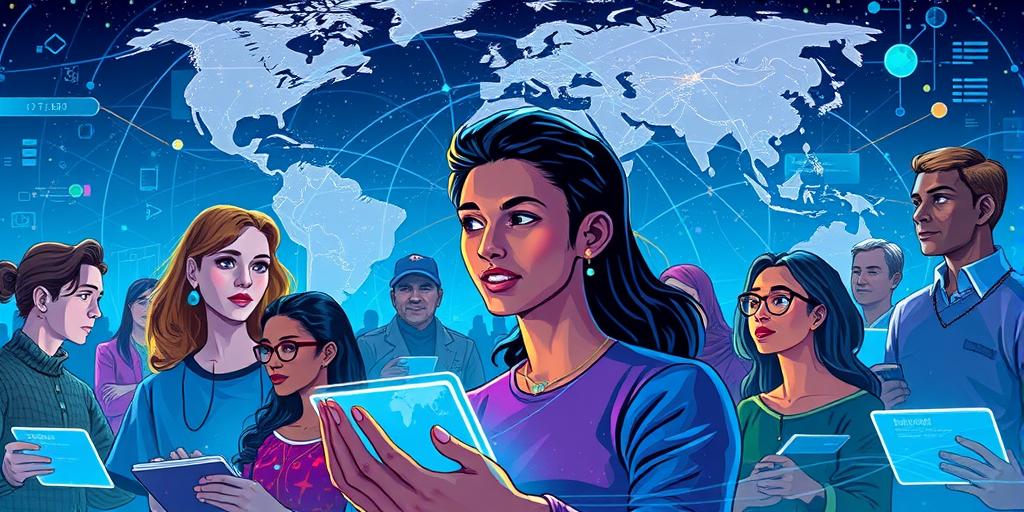In a world grappling with information asymmetry, the question of whether emerging technologies can truly democratize knowledge is paramount. Can these advancements truly level the playing field, ensuring everyone has equal access to information and educational resources? It's a complex issue with both exciting possibilities and potential pitfalls. Let's dive into the digital revolution's potential to break down barriers and empower individuals globally.
The Rise of Accessible Learning Platforms
The internet's democratizing potential is perhaps most evident in the proliferation of online learning platforms. Massive Open Online Courses (MOOCs), like Coursera and edX, offer university-level courses from top institutions worldwide, often free of charge. This has opened doors for countless individuals previously excluded from higher education due to geographical limitations, financial constraints, or other barriers. Imagine learning astrophysics from the comfort of your home, regardless of your location or background! This is the raw power of democratized learning in action.
Expanding Horizons: Microlearning and Personalized Education
But the democratization of knowledge extends beyond formal education. Microlearning platforms provide bite-sized learning modules, perfect for busy professionals or individuals seeking to upskill in specific areas. This flexibility and accessibility are game-changers, allowing individuals to learn at their own pace and convenience, focusing on skills relevant to their careers and personal goals. Further advancements in AI-powered personalized learning systems could analyze individual learning styles and preferences to tailor educational experiences, ensuring optimal learning outcomes.
Breaking Down Geographic and Socioeconomic Barriers
Emerging technologies aren't just about online platforms; they're also revolutionizing how we access information. Open Educational Resources (OER), freely accessible educational materials, are becoming increasingly prevalent. These resources, ranging from textbooks and videos to interactive simulations, are available online, breaking down geographical barriers and making education more equitable. Imagine a student in a remote village gaining access to the same high-quality educational materials as a student in a major city! That’s the power of democratized knowledge.
Bridging the Digital Divide: Overcoming Connectivity Challenges
While these advancements hold immense promise, we must acknowledge significant hurdles. The digital divide, the gap between those with and without access to technology and internet connectivity, remains a significant obstacle. Efforts to expand broadband access and provide affordable devices are critical to ensure equitable access to online learning and information resources. Without bridging this digital divide, the potential for democratization through technology remains unfulfilled. Initiatives aimed at connecting underserved communities are crucial.
The Potential Pitfalls of Digital Democratization
Despite the positive aspects, it's crucial to be aware of the potential drawbacks. The sheer volume of information online presents its own challenges—the need to discern credible sources from misinformation and disinformation. This highlights the need for media literacy education and critical thinking skills, crucial tools in navigating the digital landscape effectively. Online platforms may also perpetuate existing biases if not designed thoughtfully. Algorithms can inadvertently amplify certain viewpoints while marginalizing others, undermining the goal of truly democratized knowledge.
Ensuring Inclusivity and Addressing Bias
The design and implementation of these technologies must prioritize inclusivity. This requires careful consideration of accessibility issues for people with disabilities and the need for multilingual support to reach diverse populations. Algorithmic bias, a significant concern, must be addressed proactively. This may involve using more representative datasets and implementing fairness metrics to ensure equitable outcomes.
The Future of Knowledge Democratization
The democratization of knowledge through emerging technologies is an ongoing journey, not a destination. While significant progress has been made, addressing challenges like the digital divide, ensuring access to quality information, and mitigating algorithmic bias remains critical. Through continuous innovation, mindful design, and collaborative efforts, we can harness the transformative potential of technology to create a more equitable and informed world. Let's work together to build a future where knowledge truly belongs to everyone.
The future of learning is bright. Embrace the opportunities, overcome the challenges, and let's ensure that knowledge empowers all!









